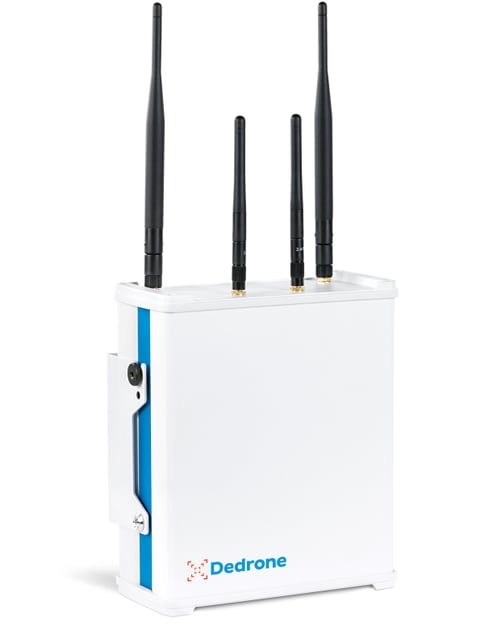

The RF-100 detects and classifies drones via multiple, integrated software-defined radios (SDRs). Detection range can reach up to 1 mile, depending on installation and environment characteristics.
Understanding how many drones intrude into the airspace
Early detection of drones, even before they take off
Classification of drone characteristics and incident logging

Drone technology advances rapidly, and only a software-centric solution can keep up. Dedrone’s DroneTracker software, hosted in the cloud or on-premise, uses our DroneDNA database to recognize and classify RF, WiFi, and non-WiFi drones. DroneTracker also integrates with 3rd-party sensors, and triggers alerts and countermeasures.
DroneDNA is a machine learning system and classification engine that recognizes drones of all kinds. Trained on millions of images and data points, it can distinguish between different drone models, and detect the difference between drones and other moving objects such as birds, planes, or other objects. DroneDNA signatures are continually updated via the cloud, enabling the Dedrone system to be always up-to-date to protect against the latest threats.
Dedrone sensors and integrated external video cameras record forensic evidence of drone intrusions. A combination of forensic data is automatically captured by the DroneTracker software, including drone manufacturer, model, time and length of drone activity, and video verification. Summary reports are automatically produced and available on-demand for easy analysis of the most critical airspace security data.
L x W x H
7.7" x 3.7" x 17.3" (195 mm x 95 mm x 440 mm)
Height without antenna: 9.8" (25mm)
Operating Temperature
-4 °F to +122 °F (-20 °C to +50 °C)
Weight
6.8 lb (3.1 kg)
Ingress Protection Rating
IP65
Connectivity
Fast-Ethernet (100 Mbit/s)
Power Supply
Active PoE+ (IEEE 802.3at)
Power Consumption
15 W (typ.)
Range
Nominal: 0.65 mi (1.0 km)
In ideal conditions: up to 1.3 mi (2.0 km)
Radio Frequency
Omnidirectional passive sensing & classification